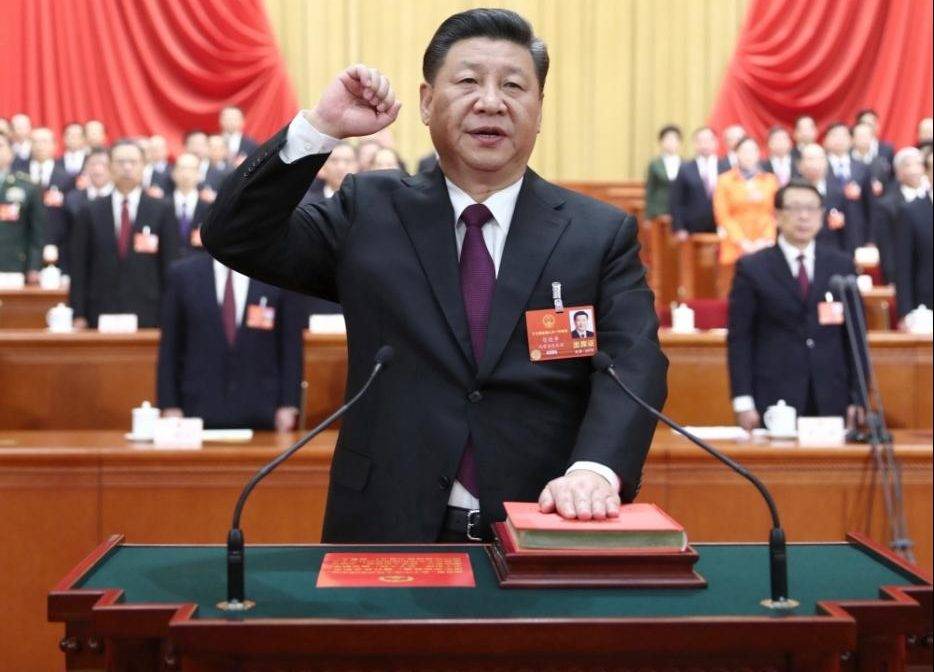Public protest against the top leadership is extremely rare in China, especially in the run-up to important political meetings, when authorities turn Beijing into a fortress to maintain security and stability…reports Asian Lite News
A rare protest against Chinese President Xi Jinping and his policies swiftly ended in Beijing Thursday, just days before he is set to secure a third term in power at a key meeting of the ruling Communist Party.
Photos circulating on Twitter showed two banners hung on an overpass of a major thoroughfare in the northwest of the Chinese capital, reports CNN.
“Say no to Covid test, yes to food. No to lockdown, yes to freedom. No to lies, yes to dignity. No to cultural revolution, yes to reform. No to great leader, yes to vote. Don’t be a slave, be a citizen,” reads one banner.
“Go on strike, remove dictator and national traitor Xi Jinping,” says another.
The photos also show plumes of smoke billowing from the bridge.
Public protest against the top leadership is extremely rare in China, especially in the run-up to important political meetings, when authorities turn Beijing into a fortress to maintain security and stability, CNN said in its report.
The twice-a-decade Communist Party national congress is the most important event on China’s political calendar.
At the 20th Party Congress beginning on Sunday, Xi is widely expected to break with recent norms and extend his rule for another term, potentially paving the way for lifelong rule.
Xi, the most powerful and authoritarian Chinese leader in decades, has waged a sweeping crackdown to crush dissent, both within the party and in wider society.
His draconian zero-Covid policy has fueled growing public frustration, as rolling lockdowns upend lives and wreak havoc on the economy.

Economy gives very little for Xi
At the 20th Party Congress set for this Sunday, Chinese President Xi Jinping is not likely to flaunt his party’s development in terms of economy as the country struggles with a continuous financial slump, according to media reports.
The Chinese economy is facing severe downward pressure and a plethora of problems which do not appear to be surmountable in the near and short terms, Financial Post reported.
According to several observers, this situation came to exist “as a result of lockdowns due to the Coronavirus, the zealous fight of the authorities against corruption and crisis in the real estate market, the economy of the Middle Kingdom may collapse.”
Financial Post reported that the conclusion has been made by the western media on the basis of assessments given by the World Bank.
As per reports, it is widely anticipated that Xi Jinping, during his speech in the 20th National Congress of the Communist Party of China (CPC) would claim that the Chinese economy has not only weathered the western sanctions but also the COVID-19 pandemic and successfully managed a reasonable growth.
However, unlike the previous congress, this time around he has little to flaunt on the front of the economy, Financial Post reported.
Notably, in the first half of the year, China recorded only 2.5 per cent growth over the past year, one of the lowest in three decades. Retail sales were 0.7 per cent less in the first half than the previous year after plunging 11 per cent in April.
China’s slowdown has been worse than anticipated amid Covid-19 outbreaks and lockdowns, and there have been further negative spillovers from the war in Ukraine.
Meanwhile, European corporate investment in China is slackening as the country’s real estate market is slumping, consumer spending drying up because of stringent “Covid zero” policies, as well as American investment is also faltering because of geopolitical tensions.
The signs are ominous for the Chinese economy as foreign investments are limited to a handful of multinationals, reported The Straits Times.
China’s published statistics for foreign direct investment show that it is gradually rising overall. But the bulk of what China counts as foreign investment is money arriving from Hong Kong, which tends to be composed of mainland money that has been briefly routed through Hong Kong as a tax-minimisation measure.
Wang Huiyao, President of the Center for China and Globalization and a Counselor with the State Council pertinently remarked: “The upcoming 20th Party Congress is set to attract global attention, as the world is eager to know how the world’s second-largest economy will navigate through risks and challenges amid the lingering pandemic and geo-political tensions.” (ANI)
